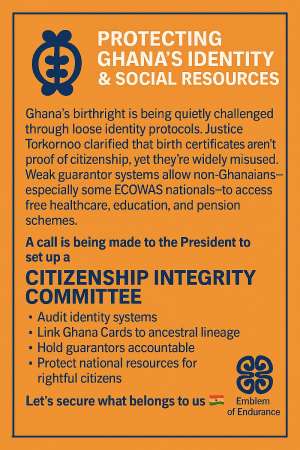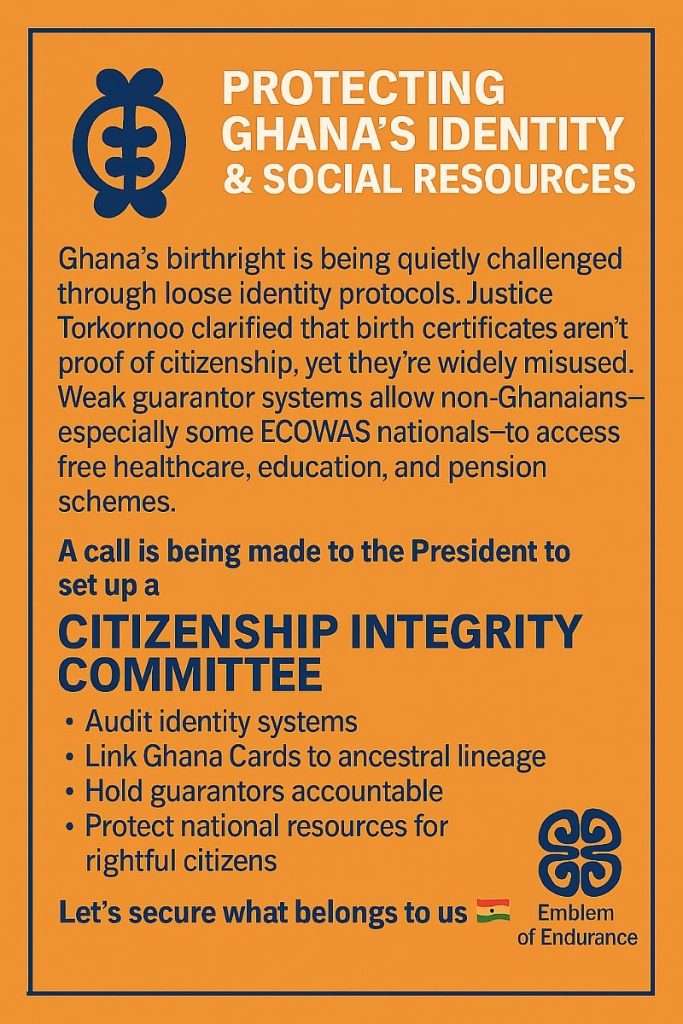
Ghana’s national identity is under quiet siege—not from invasion or unrest, but through systemic vulnerabilities in our citizenship verification processes. Birth certificates that do not equate to legal nationality, lax guarantor frameworks, and porous enforcement of ECOWAS residency protocols have inadvertently created a backdoor for non-Ghanaian nationals to access entitlements meant exclusively for Ghanaian citizens.
🇬🇭This includes free healthcare, Free SHS and tertiary education, and even long-term pension benefits. To restore balance and ensure sustainability, we propose the establishment of a Presidential Committee on Citizenship Integrity and Civic, aimed at realigning existing protocols with Ghana’s constitutional values and international best practices.
🧭 Strategic Concerns
1. Clarifying Legal Identity Beyond Birth Certificates
Justice Gertrude Torkornoo has rightly articulated that birth certificates are mere records of birth—not proof of citizenship. Yet many still rely on them to assert civic claims. A national framework must now rise to reflect this truth and build systems that verify descent and civic eligibility.
2. Reforming Guarantor Protocols in Voter and ID Registration
While guarantor systems were designed to promote inclusion, they have become a weak link in our national identity chain. Unscrupulous endorsements—whether through ignorance or complicity—allow foreign nationals to register as Ghanaians. This undermines our voter roll and social equity platforms.
3. Unregulated ECOWAS Residency Exploits
The spirit of West African unity is noble, but enforcement remains uneven. Without biometric compliance and residency monitoring, Ghana’s national provisions risk being exploited by short-term visitors who bypass the Non-Citizen Ghana Card system.
🔐 Policy Roadmap
We recommend that the Presidential Committee mandate:
Digital Lineage Verification: Link Ghana Card issuance to ancestral validation, supported by regional databases and traditional registries. Ethical Oath for Guarantors: Require civic oaths with legal accountability, co-designed with traditional councils to honor community duty. Quarterly Identity Audits in Border Districts: Deploy trained civic auditors in high-risk zones to ensure registry integrity. Threshold-Based Resource Access Monitoring: Introduce digital tools that flag disproportionate access by non-citizens to education, healthcare, and pensions.
🗣️ Cultural Lens and Civic Responsibility
Our identity is interwoven with symbols of unity and protection. Eban (security), Fawohodie (freedom), and Nkyinkyim (journey) remind us that the Ghanaian civic path is sacred—and must be protected from erosion.
To regulate access is not xenophobia—it is stewardship. It is how a nation protects the dignity of its resources, the memory of its ancestors, and the rightful claims of future generations.
📍Conclusion
The soul of Ghana lives in her people—and in the equitable sharing of her blessings. This moment calls for visionary leadership and responsible citizenship.
We urge the President of the Republic of Ghana and Commander-in-Chief of the Ghana Armed Forces and national stakeholders to initiate this Committee—not just to regulate identity, but to preserve Ghana’s promise.
“Let us fortify the foundation of citizenship so that Ghana’s legacy remains undiluted, her compassion focused, and her future sovereign.”
Retired Senior Citizen
Teshie-Nungua
[email protected]
By: Council on Civic Integrity and Heritage Stewardship


